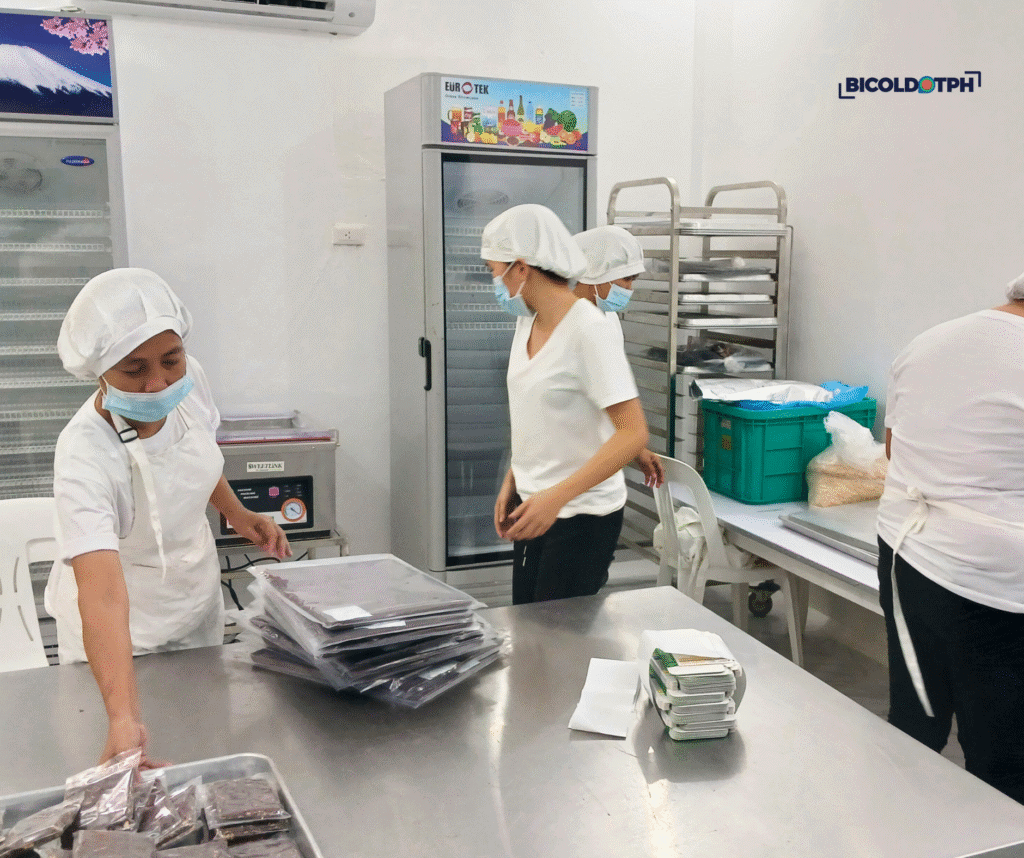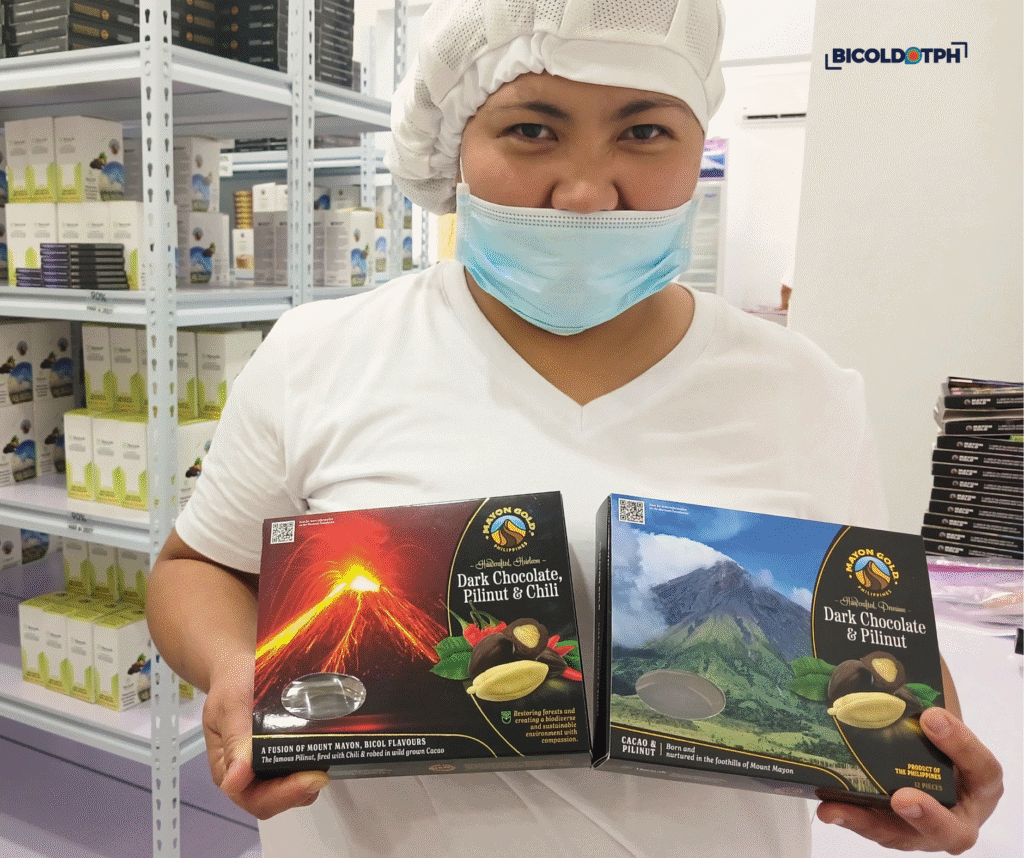What happens when solo mothers earn fair wages and dare to dream?
ALBAY – For many single mothers without a college degree, raising children often meant setting aside personal dreams. But through a community chocolate enterprise in Camalig, some are rediscovering hope.
“People have started visiting us here, including celebrities, to try our chocolates,” said Sheila Recania, 51, a chocolate maker interviewed by BicoldotPH.
She admitted having doubts at first but told herself, “If others can do it, why can’t I?” She pushed through for her two sons, with her eldest now in college.
The Muravah Foundation, through its social enterprise Mayon Gold, provides stable income to several marginalized residents of Barangay Sua and nearby villages at the foot of Mayon Volcano. The initiative intentionally prioritizes single mothers like Recania, recognizing the weight they carry alone.
The medium-sized enterprise employs 24 locals, each earning at least P500 a day. Recania is one of four regular single mothers working in its chocolate laboratory.

In Bicol, especially Albay, Camarines Sur, and Sorsogon, cacao has emerged as a strategic crop. Social enterprises like Muravah support small farmers through fermentation hubs, intercropping, and profit-sharing models that ensure above-market cacao prices and community reinvestment, sustained by donations from global allies.
Why fair pay matters
A P500 wage is slightly below the national industry average of P550 in 2024 but above the regional minimum of P435: an uncommon figure for rural employment where low-paying, unsecured informal jobs dominate. Fair pay helps correct these structural inequalities and, as UN Women emphasizes, contributes to a more dignified and just future for women.
As UN Secretary-General António Guterres noted from the same statement for International Equal Pay Day:
Equal pay is essential not only for women, but for building a world rooted in dignity and justice.
It’s a message that continues to resonate today.
Recania said she couldn’t send her sons to school without her job, which also provides monthly allowances for some staff children and relatives and complements her benefits from Pantawid Pamilyang Pilipino Program (4Ps).
Still, inflation chips away at household budgets. Single-income families like Recania’s now spend more for the same essentials. In July, the real value of Bicol’s daily minimum wage dropped to P312 from the nominal P415, based on a 1.7 percent inflation rate.
The foundation’s support, including seed funding for a sturdier home and full coverage of health and social insurance, has been crucial.
But for Recania, the journey is deeply personal. She realized that receiving government and job-related aid doesn’t mean staying in a life of lack, for it can be a stepping stone when paired with effort and determination.
“Our house now has a toilet inside, which I paid for myself,” she said with joy.
Breadwinner to an extended family
Breadwinners like Marife Moyo and Mary Joy Solano echo Recania’s quiet confidence in the progress they’ve made.

Moyo said, “If not for this work, I wouldn’t know whether I’d be staying here or working far from my child.” She hopes her child, two siblings, and a niece (all Foundation scholars) will go places like their chocolates. It’s a dream she let go of when her father fell ill.
Solano, 32, shares a similar story. She still supports five family members and had to stop schooling when her father got sick. “My daughter said she’s happy because it’s bright now. She can watch TV too,” she said, referring to their house being now connected to the grid.
The enterprise opened doors, but their progress is shaped in part by socio-economic conditions the government has a duty to address. In rural areas especially, opportunities for women to transition into the formal sector remain rare, hindered by structural and cultural inequalities.
“Fair pay is very important for women workers in the Philippines, but it’s just one piece of a bigger challenge—the gender pay gap. This gap reflects the overall difference in average earnings between men and women, shaped not only by unequal pay for equal work, but also by deeper issues like occupational segregation, limited access to leadership roles, and systemic bias,” the Philippine Business Coalition for Women Empowerment said in an email interview.
According to PBCWE, women often bear greater household responsibilities, limiting their access to better-paying jobs and upskilling opportunities. Even those in mid to senior roles frequently leave the workforce due to caregiving duties rooted in persistent social norms that challenge work-life balance.
Before joining the enterprise, Recania sold kakanin, Moyo was unemployed, and Solano worked as a househelp. Today, they say their lives have turned for the better. They now dream of owning sari-sari stores, knowing they won’t be in the chocolate lab forever.

“We’re not just making chocolate. We’re building something for our families. Now, we can dream a little bigger,” said Recania. The sentiment is shared by her colleagues.
As their aspirations grow, so do concerns about cacao’s future. Climate stress is already hitting farms elsewhere in the Philippines, with erratic rains, droughts, and stronger typhoons threatening yields. Sustaining these community-led efforts will also require government action to prevent extractive activities that threaten both land and livelihood.
The enterprise itself is not without challenges. It runs on donations, and chocolate sales can fluctuate with market demand. Sustaining fair wages and long-term support depends on continued funding and consumer interest.
That way, each bar they produce continues to reflect strength, and a life shaped more by choice than circumstance. | Mavic Conde
Editor’s Note: The real wage figure is based on Business World’s analysis. This article has been updated with the interview from Philippine Business Coalition for Women Empowerment.
Funding disclosure: This work was supported by WAN-IFRA Women in News. This story reflects the author’s perspective and not those of WAN-IFRA Women in News.
